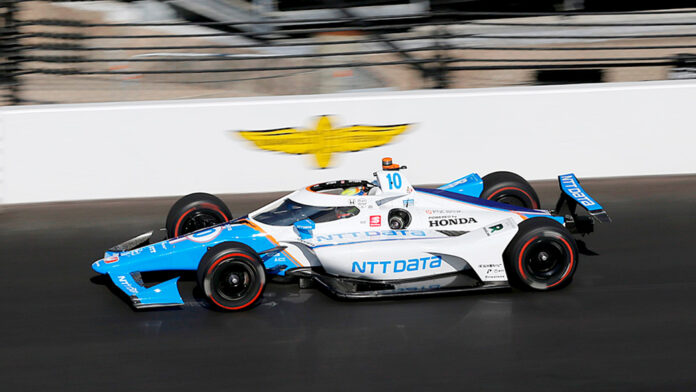NTT has said it is pulling eight billion data points from 140 sensors on every car at the Indianapolis 500 race, taking place this weekend (May 26) in Indiana in the US, into its analytics platform to provide insights and content to 300,000-odd fans at the Indianapolis Speedway. It is working with subsidiary NTT DATA on the project; they are technology partners of the Indy 500 and the Indianapolis Speedway, plus associated events.
The Indy 500 is billed as the “world’s largest single-day sporting event”. Fans at the event, and also watching on television from home, will get live race data, from the lineup of 33 cars, which race for 500 miles around the track, on the ‘command displays’ at the ground and via broadcast coverage. This will enhance “storytelling of key moments during events including head-to-head overtaking, race strategies, race winner predictions, and more”, said NTT.
Insights about race positions and performance, and streams of the drivers from 15 in-car cameras, are being used in the INDYCAR app, as well – which gets 70,000 users on race days, apparently. NTT also talked up its use of AI on cameras and other IoT sensors for security detection and traffic flow. This data, calibrated every 30 seconds, is linked with digital ticketing at the venue to provide live and predictive wait-times at gates and concessions.
NTT is using the event to show off its R&D, as well. Its so-called Embodied Knowledge technology is being used in a “limited racing demo” in simulators that replicate the experience of driving on the track. NTT said: “Embodied Knowledge adds the actual feel and performance of the professional driver at high speeds… including realistic steering wheel forces and car behavior like vibrations and forces exerted on the seat.”
The underlying echnology is being discussed for medical surgery training, as well as for use cases in retail, education, manufacturing, and other coaching and fan experiences in sports, said NTT. It said: “[It is being assessed to] enable AI-robots to learn how to move and react the way humans perform tasks from restocking shelves to in-home caregiving.” NTT $3.6 billion per year in R&D, it said.
Roger Penske, chairman of Penske Corporation, which owns INDYCAR, said: “NTT DATA has pushed the boundaries of how technology can impact motorsports, helping us tap into vast amounts of data in advanced and productive ways. [It] has delivered meaningful improvements to operations at Indianapolis Motor Speedway through its NTT Smart Venue technology, driving new levels of safety, security and efficiency for 300,000 fans in the stands, while also supplying real-time data feeds into race control as well as our… app.”
Eric Clark, chief executive at NTT DATA in North America, said: “Few organizations produce as much real-time data and analytics as NTT INDYCAR SERIES racing teams and venues. Partnering with INDYCAR helps us explore and pressure test our offerings in intense real-time settings. We use those learnings to help our clients innovate and transform their operations, improve sustainability, leverage AI and enhance customer experiences.”
Kota Hidaka, head of NTT’s Human Informatics Laboratories, commented: “The Indianapolis 500 is the pinnacle of racing that leverages refined Embodied Knowledge where firsthand the movements of racers can be felt to understand what Embodied Knowledge truly means. Through various sensing technologies, we aim to technically recreate these movements and sensations.”

